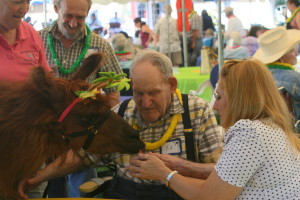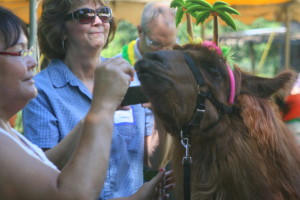Pet therapy (referred to most often as animal assisted therapy or AAT) for people with Alzheimer’s and other dementia’s has seen an increase of interest and attention over the last several years. Caregivers, whether working in a facility or in home, observe a positive net effect of having controlled time with pets. The current emphasis on making assisted living centers more like home is having significant effect on residents overall demeanor.
Dr. William Thomas introduced a theory along those lines several years ago. This new way of thinking encouraged others to reconsider how care facilities were designed and run. He noted that residents in facilities often suffered from feeling bored, lonely and helpless. He also encouraged that bringing in children, plants and animals were some of the ways to combat the negative behaviors and issues apparent in some patients.
This movement, along with several others, has increased the presence of animals in care facilities. But, the question still remains, do they help? It is common knowledge that not everyone is a lover of animals, but the answer is still a resounding “Yes”. Overwhelmingly, research supports the positive benefits of use of animals in therapy with people who have Alzheimer’s and other forms of dementia.
Benefits of Pet Therapy
Hundreds of research articles have been published on the benefits of pet therapy for people with dementia. Some of the benefits include:
- An Improvement in Mood
Several studies have noted benefits of improved mood and an increased level of social interaction. These are benefits that help guard against depression; especially since people with dementia are candidates for developing depression. AAT is proven to improve mood which can help with their day to day functioning and improve quality of life.
A particular study evaluated AAT at an adult day care center designed for older adults with Alzheimer’s. The results indicate that when people are involved in activities with dogs, there is a decrease in feelings of anxiety and sadness. Conversely, there is increased physical activity and positive emotions. These results have become self-evident to those facilities that have chosen to employee AAT.
- Calming Effect
In 2008, a study by psychologists observed a calming effect following pet therapy in a small sample of resident care facilities. Other studies have shown that animal-assisted therapy yields a significant lowering of blood pressure levels in residents.
- Improved Behavior
Another completed study measured the effects of a resident dog, as opposed to a visiting dog, in a care facility. The researchers observed that after the addition of the dog to the Alzheimer’s unit, the residents’ “challenging” behaviors significantly decreased during the day.
- Improved Nutrition
Another study showed that by placing aquariums in a facility, the residents’ food intake was higher and body weight increased. This actually decreased the need for nutritional supplements, which lowered costs for the facility.
Types of Pet Therapy
 Animal-assisted therapy runs the gamut and can include cats, bird aviaries, trained dogs and fish aquariums, field trips to farms, etc. Some care facilities have animals that reside at the facility, while others have outside sources that bring animals in to visit on a regular basis.
Animal-assisted therapy runs the gamut and can include cats, bird aviaries, trained dogs and fish aquariums, field trips to farms, etc. Some care facilities have animals that reside at the facility, while others have outside sources that bring animals in to visit on a regular basis.
Although most of the research on pet therapy has been conducted in resident facilities, it can also be used if someone with dementia is living at home. The presence of a dog, cat or other animals at home can provide some of the same benefits as noted above.
It is important that animals used for AAT should be current on their shots. They need to be well-trained and monitored to ensure S afety above all. Another important note is to minimize pet exposure for people who have allergies or simply don’t care to have interaction with them.
afety above all. Another important note is to minimize pet exposure for people who have allergies or simply don’t care to have interaction with them.
Taking Action
It is one thing to know about the positive benefits of pet therapy, but putting knowledge into action is where the benefit resides.
At Country Side Living, our heart is to serve the residents entrusted to us with love and compassion using the best practices suited for their needs. One of the events we look forward to at CSL is the annual field trip to the Berkey Family Farm. This is an opportunity for our residents and their families to share the beautiful outdoors, good food and some very special pets with the guests.
Animal Assisted Therapy is a tried and true method of bringing joy and laughter into the lives of the residents we care for. The residents may not remember, but the families who watch their loved ones smile and enjoy a day in the country will never forget.
